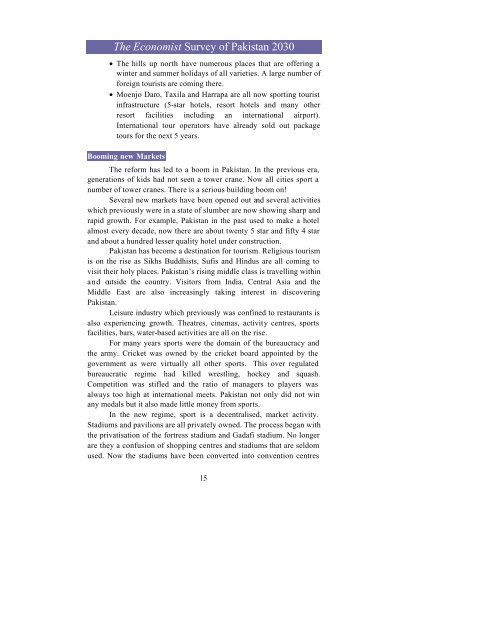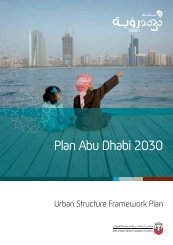economist-survey
economist-survey
economist-survey
You also want an ePaper? Increase the reach of your titles
YUMPU automatically turns print PDFs into web optimized ePapers that Google loves.
The Economist Survey of Pakistan 2030<br />
• The hills up north have numerous places that are offering a<br />
winter and summer holidays of all varieties. A large number of<br />
foreign tourists are coming there.<br />
• Moenjo Daro, Taxila and Harrapa are all now sporting tourist<br />
infrastructure (5-star hotels, resort hotels and many other<br />
resort facilities including an international airport).<br />
International tour operators have already sold out package<br />
tours for the next 5 years.<br />
Booming new Markets<br />
The reform has led to a boom in Pakistan. In the previous era,<br />
generations of kids had not seen a tower crane. Now all cities sport a<br />
number of tower cranes. There is a serious building boom on!<br />
Several new markets have been opened out and several activities<br />
which previously were in a state of slumber are now showing sharp and<br />
rapid growth. For example, Pakistan in the past used to make a hotel<br />
almost every decade, now there are about twenty 5 star and fifty 4 star<br />
and about a hundred lesser quality hotel under construction.<br />
Pakistan has become a destination for tourism. Religious tourism<br />
is on the rise as Sikhs Buddhists, Sufis and Hindus are all coming to<br />
visit their holy places. Pakistan’s rising middle class is travelling within<br />
and outside the country. Visitors from India, Central Asia and the<br />
Middle East are also increasingly taking interest in discovering<br />
Pakistan.<br />
Leisure industry which previously was confined to restaurants is<br />
also experiencing growth. Theatres, cinemas, activity centres, sports<br />
facilities, bars, water-based activities are all on the rise.<br />
For many years sports were the domain of the bureaucracy and<br />
the army. Cricket was owned by the cricket board appointed by the<br />
government as were virtually all other sports. This over regulated<br />
bureaucratic regime had killed wrestling, hockey and squash.<br />
Competition was stifled and the ratio of managers to players was<br />
always too high at international meets. Pakistan not only did not win<br />
any medals but it also made little money from sports.<br />
In the new regime, sport is a decentralised, market activity.<br />
Stadiums and pavilions are all privately owned. The process began with<br />
the privatisation of the fortress stadium and Gadafi stadium. No longer<br />
are they a confusion of shopping centres and stadiums that are seldom<br />
used. Now the stadiums have been converted into convention centres<br />
15




